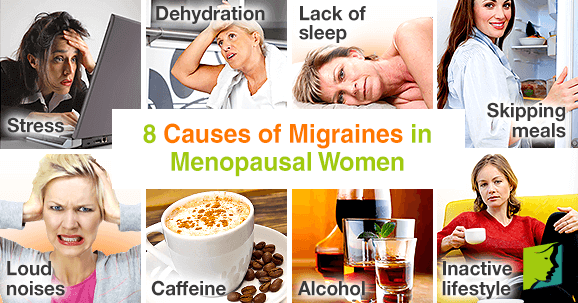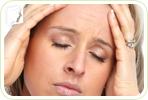Migraine symptoms affect around 29.5 million Americans. The primary cause of migraines in menopausal women is hormone fluctuations. Migraine headaches are typically described by persistent, throbbing pain that starts on one side of the head. Hormones are fluctuating during menopause, causing inflammation of blood vessels. These inflamed blood vessels in the scalp constantly dilate and contract, which results in pain. Migraine headaches are much more severe than the more common tension headaches, and also cause nausea and vomiting. Keep reading to learn more about migraines in menopausal women.
Causes
While hormone fluctuations are the main cause of migraines during menopause, there are a number of other contributing factors as well.
Stress
Excessive stress is one of the most common migraine causes. Stress allows tension to build up and also weakens the body, making it susceptible to illnesses. Yoga, meditation, or getting a massage are all beneficial ways to relieve stress.
Dehydration
This one is a no-brainer, but staying properly hydrated is key to feeling your best and preventing migraines, fatigue, and several other ailments. The standard recommendation for daily water consumption is the equivalent of eight glasses. Staying hydrated also optimizes bodily functions and increases metabolic rate.
Lack of sleep
Inadequate sleep can make the body susceptible to migraines and other menopausal symptoms. The average adult needs between seven and eight hours of sleep every night in order to stay healthy and have sufficient energy throughout the day.
Skipping meals
Blood sugar levels drop sharply when you skip meals, which can cause migraines. It is vital to eat healthy, balanced meals and snacks every three to four hours to stay alert and prevent headaches.
Loud noises
For those who are prone to migraines, seemingly minor environmental factors such as loud noises, bright lights, and strong odors can trigger a migraine.
Caffeine
Caffeine dehydrates the body very quickly, which is also a leading cause of migraines. Avoid drinking too many cups of coffee or tea during the day to prevent migraines.
Alcohol
It is common knowledge that drinking large amounts of alcohol can cause severe headaches the next day (i.e., a hangover). Alcohol also severely dehydrates the body, making it more susceptible to migraines.
Inactive lifestyle
Living a sedentary lifestyle can lead to many health problems, like chronic headaches, obesity, depression, anxiety, and chronic fatigue.
Women are far more likely to experience migraines than men, which can be attributed to the hormone fluctuations experienced during the menopause transition. While hormone fluctuations are the primary cause of headaches in menopausal women, there are several other causes of migraines, like lack of sleep and exercise, caffeine, and excessive stress. It is crucial to maintain a healthy and active lifestyle to prevent bothersome menopausal symptoms, like migraines.
Sources
- National Health Service UK. (2013). Hormone headaches. Retrieved November 11, 2014, from http://www.nhs.uk/livewell/headaches/pages/hormonalheadaches.aspx
- National Health Service UK. (2014). Migraines - Causes. Retrieved November 11, 2014, from http://www.nhs.uk/conditions/migraine/pages/causes.aspx
- Office on Women's Health. (2012). Migraine fact sheet. Retrieved November 11, 2014, from http://www.womenshealth.gov/publications/our-publications/fact-sheet/migraine.html#n




